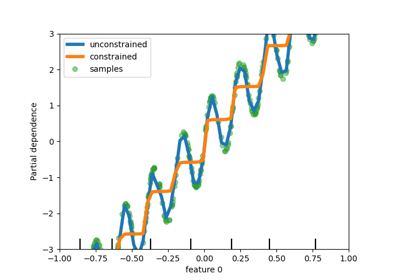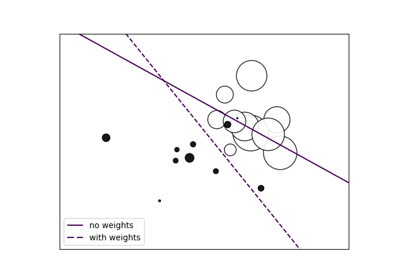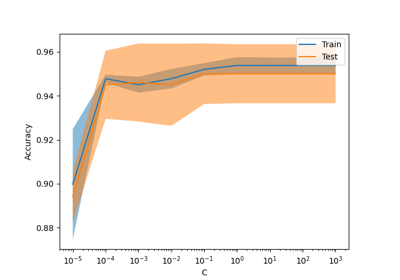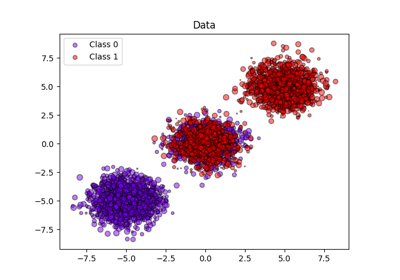Note
Go to the end to download the full example code or to run this example in your browser via JupyterLite or Binder
Metadata Routing#
This document shows how you can use the metadata routing mechanism in scikit-learn to route metadata through meta-estimators
to the estimators consuming them. To better understand the rest of the
document, we need to introduce two concepts: routers and consumers. A router is
an object, in most cases a meta-estimator, which forwards given data and
metadata to other objects and estimators. A consumer, on the other hand, is an
object which accepts and uses a certain given metadata. For instance, an
estimator taking into account sample_weight in its fit method is a
consumer of sample_weight. It is possible for an object to be both a router
and a consumer. For instance, a meta-estimator may take into account
sample_weight in certain calculations, but it may also route it to the
underlying estimator.
First a few imports and some random data for the rest of the script.
import warnings
from pprint import pprint
import numpy as np
from sklearn import set_config
from sklearn.base import (
BaseEstimator,
ClassifierMixin,
MetaEstimatorMixin,
RegressorMixin,
TransformerMixin,
clone,
)
from sklearn.linear_model import LinearRegression
from sklearn.utils import metadata_routing
from sklearn.utils.metadata_routing import (
MetadataRouter,
MethodMapping,
get_routing_for_object,
process_routing,
)
from sklearn.utils.validation import check_is_fitted
n_samples, n_features = 100, 4
rng = np.random.RandomState(42)
X = rng.rand(n_samples, n_features)
y = rng.randint(0, 2, size=n_samples)
my_groups = rng.randint(0, 10, size=n_samples)
my_weights = rng.rand(n_samples)
my_other_weights = rng.rand(n_samples)
This feature is only available if explicitly enabled:
set_config(enable_metadata_routing=True)
This utility function is a dummy to check if a metadata is passed.
def check_metadata(obj, **kwargs):
for key, value in kwargs.items():
if value is not None:
print(
f"Received {key} of length = {len(value)} in {obj.__class__.__name__}."
)
else:
print(f"{key} is None in {obj.__class__.__name__}.")
A utility function to nicely print the routing information of an object
def print_routing(obj):
pprint(obj.get_metadata_routing()._serialize())
Estimators#
Here we demonstrate how an estimator can expose the required API to support
metadata routing as a consumer. Imagine a simple classifier accepting
sample_weight as a metadata on its fit and groups in its
predict method:
class ExampleClassifier(ClassifierMixin, BaseEstimator):
def fit(self, X, y, sample_weight=None):
check_metadata(self, sample_weight=sample_weight)
# all classifiers need to expose a classes_ attribute once they're fit.
self.classes_ = np.array([0, 1])
return self
def predict(self, X, groups=None):
check_metadata(self, groups=groups)
# return a constant value of 1, not a very smart classifier!
return np.ones(len(X))
The above estimator now has all it needs to consume metadata. This is
accomplished by some magic done in BaseEstimator. There are
now three methods exposed by the above class: set_fit_request,
set_predict_request, and get_metadata_routing. There is also a
set_score_request for sample_weight which is present since
ClassifierMixin implements a score method accepting
sample_weight. The same applies to regressors which inherit from
RegressorMixin.
By default, no metadata is requested, which we can see as:
print_routing(ExampleClassifier())
{'fit': {'sample_weight': None},
'predict': {'groups': None},
'score': {'sample_weight': None}}
The above output means that sample_weight and groups are not
requested, but if a router is given those metadata, it should raise an error,
since the user has not explicitly set whether they are required or not. The
same is true for sample_weight in the score method, which is
inherited from ClassifierMixin. In order to explicitly set
request values for those metadata, we can use these methods:
est = (
ExampleClassifier()
.set_fit_request(sample_weight=False)
.set_predict_request(groups=True)
.set_score_request(sample_weight=False)
)
print_routing(est)
{'fit': {'sample_weight': False},
'predict': {'groups': True},
'score': {'sample_weight': False}}
Note
Please note that as long as the above estimator is not used in another meta-estimator, the user does not need to set any requests for the metadata and the set values are ignored, since a consumer does not validate or route given metadata. A simple usage of the above estimator would work as expected.
est = ExampleClassifier()
est.fit(X, y, sample_weight=my_weights)
est.predict(X[:3, :], groups=my_groups)
Received sample_weight of length = 100 in ExampleClassifier.
Received groups of length = 100 in ExampleClassifier.
array([1., 1., 1.])
Now let’s have a meta-estimator, which doesn’t do much other than routing the metadata.
class MetaClassifier(MetaEstimatorMixin, ClassifierMixin, BaseEstimator):
def __init__(self, estimator):
self.estimator = estimator
def get_metadata_routing(self):
# This method defines the routing for this meta-estimator.
# In order to do so, a `MetadataRouter` instance is created, and the
# right routing is added to it. More explanations follow.
router = MetadataRouter(owner=self.__class__.__name__).add(
estimator=self.estimator, method_mapping="one-to-one"
)
return router
def fit(self, X, y, **fit_params):
# meta-estimators are responsible for validating the given metadata.
# `get_routing_for_object` is a safe way to construct a
# `MetadataRouter` or a `MetadataRequest` from the given object.
request_router = get_routing_for_object(self)
request_router.validate_metadata(params=fit_params, method="fit")
# we can use provided utility methods to map the given metadata to what
# is required by the underlying estimator. Here `method` refers to the
# parent's method, i.e. `fit` in this example.
routed_params = request_router.route_params(params=fit_params, caller="fit")
# the output has a key for each object's method which is used here,
# i.e. parent's `fit` method, containing the metadata which should be
# routed to them, based on the information provided in
# `get_metadata_routing`.
self.estimator_ = clone(self.estimator).fit(X, y, **routed_params.estimator.fit)
self.classes_ = self.estimator_.classes_
return self
def predict(self, X, **predict_params):
check_is_fitted(self)
# same as in `fit`, we validate the given metadata
request_router = get_routing_for_object(self)
request_router.validate_metadata(params=predict_params, method="predict")
# and then prepare the input to the underlying `predict` method.
routed_params = request_router.route_params(
params=predict_params, caller="predict"
)
return self.estimator_.predict(X, **routed_params.estimator.predict)
Let’s break down different parts of the above code.
First, the get_routing_for_object takes an
estimator (self) and returns a
MetadataRouter or a
MetadataRequest based on the output of the
estimator’s get_metadata_routing method.
Then in each method, we use the route_params method to construct a
dictionary of the form {"object_name": {"method_name": {"metadata":
value}}} to pass to the underlying estimator’s method. The object_name
(estimator in the above routed_params.estimator.fit example) is the
same as the one added in the get_metadata_routing. validate_metadata
makes sure all given metadata are requested to avoid silent bugs. Now, we
illustrate the different behaviors and notably the type of errors raised:
est = MetaClassifier(estimator=ExampleClassifier().set_fit_request(sample_weight=True))
est.fit(X, y, sample_weight=my_weights)
Received sample_weight of length = 100 in ExampleClassifier.
Note that the above example checks that sample_weight is correctly passed
to ExampleClassifier, or else it would print that sample_weight is
None:
est.fit(X, y)
sample_weight is None in ExampleClassifier.
If we pass an unknown metadata, an error is raised:
try:
est.fit(X, y, test=my_weights)
except TypeError as e:
print(e)
MetaClassifier.fit got unexpected argument(s) {'test'}, which are not requested metadata in any object.
And if we pass a metadata which is not explicitly requested:
try:
est.fit(X, y, sample_weight=my_weights).predict(X, groups=my_groups)
except ValueError as e:
print(e)
Received sample_weight of length = 100 in ExampleClassifier.
[groups] are passed but are not explicitly set as requested or not for ExampleClassifier.predict
Also, if we explicitly set it as not requested, but it is provided:
est = MetaClassifier(
estimator=ExampleClassifier()
.set_fit_request(sample_weight=True)
.set_predict_request(groups=False)
)
try:
est.fit(X, y, sample_weight=my_weights).predict(X[:3, :], groups=my_groups)
except TypeError as e:
print(e)
Received sample_weight of length = 100 in ExampleClassifier.
MetaClassifier.predict got unexpected argument(s) {'groups'}, which are not requested metadata in any object.
Another concept to introduce is aliased metadata. This is when an estimator
requests a metadata with a different name than the default value. For
instance, in a setting where there are two estimators in a pipeline, one
could request sample_weight1 and the other sample_weight2. Note that
this doesn’t change what the estimator expects, it only tells the
meta-estimator how to map the provided metadata to what’s required. Here’s an
example, where we pass aliased_sample_weight to the meta-estimator, but
the meta-estimator understands that aliased_sample_weight is an alias for
sample_weight, and passes it as sample_weight to the underlying
estimator:
est = MetaClassifier(
estimator=ExampleClassifier().set_fit_request(sample_weight="aliased_sample_weight")
)
est.fit(X, y, aliased_sample_weight=my_weights)
Received sample_weight of length = 100 in ExampleClassifier.
And passing sample_weight here will fail since it is requested with an
alias and sample_weight with that name is not requested:
try:
est.fit(X, y, sample_weight=my_weights)
except TypeError as e:
print(e)
MetaClassifier.fit got unexpected argument(s) {'sample_weight'}, which are not requested metadata in any object.
This leads us to the get_metadata_routing. The way routing works in
scikit-learn is that consumers request what they need, and routers pass that
along. Additionally, a router exposes what it requires itself so that it can
be used inside another router, e.g. a pipeline inside a grid search object.
The output of the get_metadata_routing which is a dictionary
representation of a MetadataRouter, includes
the complete tree of requested metadata by all nested objects and their
corresponding method routings, i.e. which method of a sub-estimator is used
in which method of a meta-estimator:
print_routing(est)
{'estimator': {'mapping': [{'callee': 'fit', 'caller': 'fit'},
{'callee': 'partial_fit', 'caller': 'partial_fit'},
{'callee': 'predict', 'caller': 'predict'},
{'callee': 'predict_proba',
'caller': 'predict_proba'},
{'callee': 'predict_log_proba',
'caller': 'predict_log_proba'},
{'callee': 'decision_function',
'caller': 'decision_function'},
{'callee': 'score', 'caller': 'score'},
{'callee': 'split', 'caller': 'split'},
{'callee': 'transform', 'caller': 'transform'},
{'callee': 'inverse_transform',
'caller': 'inverse_transform'},
{'callee': 'fit_transform',
'caller': 'fit_transform'},
{'callee': 'fit_predict', 'caller': 'fit_predict'}],
'router': {'fit': {'sample_weight': 'aliased_sample_weight'},
'predict': {'groups': None},
'score': {'sample_weight': None}}}}
As you can see, the only metadata requested for method fit is
"sample_weight" with "aliased_sample_weight" as the alias. The
~utils.metadata_routing.MetadataRouter class enables us to easily create
the routing object which would create the output we need for our
get_metadata_routing. In the above implementation,
mapping="one-to-one" means there is a one to one mapping between
sub-estimator’s methods and meta-estimator’s ones, i.e. fit used in
fit and so on. In order to understand how aliases work in
meta-estimators, imagine our meta-estimator inside another one:
meta_est = MetaClassifier(estimator=est).fit(X, y, aliased_sample_weight=my_weights)
Received sample_weight of length = 100 in ExampleClassifier.
In the above example, this is how each fit method will call the
sub-estimator’s fit:
meta_est.fit(X, y, aliased_sample_weight=my_weights):
... # this estimator (est), expects aliased_sample_weight as seen above
self.estimator_.fit(X, y, aliased_sample_weight=aliased_sample_weight):
... # now est passes aliased_sample_weight's value as sample_weight,
# which is expected by the sub-estimator
self.estimator_.fit(X, y, sample_weight=aliased_sample_weight)
...
Router and Consumer#
To show how a slightly more complex case would work, consider a case where a meta-estimator uses some metadata, but it also routes them to an underlying estimator. In this case, this meta-estimator is a consumer and a router at the same time. This is how we can implement one, and it is very similar to what we had before, with a few tweaks.
class RouterConsumerClassifier(MetaEstimatorMixin, ClassifierMixin, BaseEstimator):
def __init__(self, estimator):
self.estimator = estimator
def get_metadata_routing(self):
router = (
MetadataRouter(owner=self.__class__.__name__)
.add_self_request(self)
.add(estimator=self.estimator, method_mapping="one-to-one")
)
return router
def fit(self, X, y, sample_weight, **fit_params):
if self.estimator is None:
raise ValueError("estimator cannot be None!")
check_metadata(self, sample_weight=sample_weight)
if sample_weight is not None:
fit_params["sample_weight"] = sample_weight
# meta-estimators are responsible for validating the given metadata
request_router = get_routing_for_object(self)
request_router.validate_metadata(params=fit_params, method="fit")
# we can use provided utility methods to map the given metadata to what
# is required by the underlying estimator
params = request_router.route_params(params=fit_params, caller="fit")
self.estimator_ = clone(self.estimator).fit(X, y, **params.estimator.fit)
self.classes_ = self.estimator_.classes_
return self
def predict(self, X, **predict_params):
check_is_fitted(self)
# same as in ``fit``, we validate the given metadata
request_router = get_routing_for_object(self)
request_router.validate_metadata(params=predict_params, method="predict")
# and then prepare the input to the underlying ``predict`` method.
params = request_router.route_params(params=predict_params, caller="predict")
return self.estimator_.predict(X, **params.estimator.predict)
The key parts where the above estimator differs from our previous
meta-estimator is accepting sample_weight explicitly in fit and
including it in fit_params. Making sample_weight an explicit argument
makes sure set_fit_request(sample_weight=...) is present for this class.
In a sense, this means the estimator is both a consumer, as well as a router
of sample_weight.
In get_metadata_routing, we add self to the routing using
add_self_request to indicate this estimator is consuming
sample_weight as well as being a router; which also adds a
$self_request key to the routing info as illustrated below. Now let’s
look at some examples:
No metadata requested
est = RouterConsumerClassifier(estimator=ExampleClassifier())
print_routing(est)
{'$self_request': {'fit': {'sample_weight': None},
'score': {'sample_weight': None}},
'estimator': {'mapping': [{'callee': 'fit', 'caller': 'fit'},
{'callee': 'partial_fit', 'caller': 'partial_fit'},
{'callee': 'predict', 'caller': 'predict'},
{'callee': 'predict_proba',
'caller': 'predict_proba'},
{'callee': 'predict_log_proba',
'caller': 'predict_log_proba'},
{'callee': 'decision_function',
'caller': 'decision_function'},
{'callee': 'score', 'caller': 'score'},
{'callee': 'split', 'caller': 'split'},
{'callee': 'transform', 'caller': 'transform'},
{'callee': 'inverse_transform',
'caller': 'inverse_transform'},
{'callee': 'fit_transform',
'caller': 'fit_transform'},
{'callee': 'fit_predict', 'caller': 'fit_predict'}],
'router': {'fit': {'sample_weight': None},
'predict': {'groups': None},
'score': {'sample_weight': None}}}}
sample_weightrequested by underlying estimator
est = RouterConsumerClassifier(
estimator=ExampleClassifier().set_fit_request(sample_weight=True)
)
print_routing(est)
{'$self_request': {'fit': {'sample_weight': None},
'score': {'sample_weight': None}},
'estimator': {'mapping': [{'callee': 'fit', 'caller': 'fit'},
{'callee': 'partial_fit', 'caller': 'partial_fit'},
{'callee': 'predict', 'caller': 'predict'},
{'callee': 'predict_proba',
'caller': 'predict_proba'},
{'callee': 'predict_log_proba',
'caller': 'predict_log_proba'},
{'callee': 'decision_function',
'caller': 'decision_function'},
{'callee': 'score', 'caller': 'score'},
{'callee': 'split', 'caller': 'split'},
{'callee': 'transform', 'caller': 'transform'},
{'callee': 'inverse_transform',
'caller': 'inverse_transform'},
{'callee': 'fit_transform',
'caller': 'fit_transform'},
{'callee': 'fit_predict', 'caller': 'fit_predict'}],
'router': {'fit': {'sample_weight': True},
'predict': {'groups': None},
'score': {'sample_weight': None}}}}
sample_weightrequested by meta-estimator
est = RouterConsumerClassifier(estimator=ExampleClassifier()).set_fit_request(
sample_weight=True
)
print_routing(est)
{'$self_request': {'fit': {'sample_weight': True},
'score': {'sample_weight': None}},
'estimator': {'mapping': [{'callee': 'fit', 'caller': 'fit'},
{'callee': 'partial_fit', 'caller': 'partial_fit'},
{'callee': 'predict', 'caller': 'predict'},
{'callee': 'predict_proba',
'caller': 'predict_proba'},
{'callee': 'predict_log_proba',
'caller': 'predict_log_proba'},
{'callee': 'decision_function',
'caller': 'decision_function'},
{'callee': 'score', 'caller': 'score'},
{'callee': 'split', 'caller': 'split'},
{'callee': 'transform', 'caller': 'transform'},
{'callee': 'inverse_transform',
'caller': 'inverse_transform'},
{'callee': 'fit_transform',
'caller': 'fit_transform'},
{'callee': 'fit_predict', 'caller': 'fit_predict'}],
'router': {'fit': {'sample_weight': None},
'predict': {'groups': None},
'score': {'sample_weight': None}}}}
Note the difference in the requested metadata representations above.
We can also alias the metadata to pass different values to them:
est = RouterConsumerClassifier(
estimator=ExampleClassifier().set_fit_request(sample_weight="clf_sample_weight"),
).set_fit_request(sample_weight="meta_clf_sample_weight")
print_routing(est)
{'$self_request': {'fit': {'sample_weight': 'meta_clf_sample_weight'},
'score': {'sample_weight': None}},
'estimator': {'mapping': [{'callee': 'fit', 'caller': 'fit'},
{'callee': 'partial_fit', 'caller': 'partial_fit'},
{'callee': 'predict', 'caller': 'predict'},
{'callee': 'predict_proba',
'caller': 'predict_proba'},
{'callee': 'predict_log_proba',
'caller': 'predict_log_proba'},
{'callee': 'decision_function',
'caller': 'decision_function'},
{'callee': 'score', 'caller': 'score'},
{'callee': 'split', 'caller': 'split'},
{'callee': 'transform', 'caller': 'transform'},
{'callee': 'inverse_transform',
'caller': 'inverse_transform'},
{'callee': 'fit_transform',
'caller': 'fit_transform'},
{'callee': 'fit_predict', 'caller': 'fit_predict'}],
'router': {'fit': {'sample_weight': 'clf_sample_weight'},
'predict': {'groups': None},
'score': {'sample_weight': None}}}}
However, fit of the meta-estimator only needs the alias for the
sub-estimator, since it doesn’t validate and route its own required metadata:
est.fit(X, y, sample_weight=my_weights, clf_sample_weight=my_other_weights)
Received sample_weight of length = 100 in RouterConsumerClassifier.
Received sample_weight of length = 100 in ExampleClassifier.
Alias only on the sub-estimator. This is useful if we don’t want the meta-estimator to use the metadata, and we only want the metadata to be used by the sub-estimator.
est = RouterConsumerClassifier(
estimator=ExampleClassifier().set_fit_request(sample_weight="aliased_sample_weight")
).set_fit_request(sample_weight=True)
print_routing(est)
{'$self_request': {'fit': {'sample_weight': True},
'score': {'sample_weight': None}},
'estimator': {'mapping': [{'callee': 'fit', 'caller': 'fit'},
{'callee': 'partial_fit', 'caller': 'partial_fit'},
{'callee': 'predict', 'caller': 'predict'},
{'callee': 'predict_proba',
'caller': 'predict_proba'},
{'callee': 'predict_log_proba',
'caller': 'predict_log_proba'},
{'callee': 'decision_function',
'caller': 'decision_function'},
{'callee': 'score', 'caller': 'score'},
{'callee': 'split', 'caller': 'split'},
{'callee': 'transform', 'caller': 'transform'},
{'callee': 'inverse_transform',
'caller': 'inverse_transform'},
{'callee': 'fit_transform',
'caller': 'fit_transform'},
{'callee': 'fit_predict', 'caller': 'fit_predict'}],
'router': {'fit': {'sample_weight': 'aliased_sample_weight'},
'predict': {'groups': None},
'score': {'sample_weight': None}}}}
Simple Pipeline#
A slightly more complicated use-case is a meta-estimator which does something
similar to the Pipeline. Here is a meta-estimator, which
accepts a transformer and a classifier, and applies the transformer before
running the classifier.
class SimplePipeline(ClassifierMixin, BaseEstimator):
_required_parameters = ["estimator"]
def __init__(self, transformer, classifier):
self.transformer = transformer
self.classifier = classifier
def get_metadata_routing(self):
router = (
MetadataRouter(owner=self.__class__.__name__)
.add(
transformer=self.transformer,
method_mapping=MethodMapping()
.add(callee="fit", caller="fit")
.add(callee="transform", caller="fit")
.add(callee="transform", caller="predict"),
)
.add(classifier=self.classifier, method_mapping="one-to-one")
)
return router
def fit(self, X, y, **fit_params):
params = process_routing(self, "fit", **fit_params)
self.transformer_ = clone(self.transformer).fit(X, y, **params.transformer.fit)
X_transformed = self.transformer_.transform(X, **params.transformer.transform)
self.classifier_ = clone(self.classifier).fit(
X_transformed, y, **params.classifier.fit
)
return self
def predict(self, X, **predict_params):
params = process_routing(self, "predict", **predict_params)
X_transformed = self.transformer_.transform(X, **params.transformer.transform)
return self.classifier_.predict(X_transformed, **params.classifier.predict)
Note the usage of MethodMapping to declare
which methods of the child estimator (callee) are used in which methods of
the meta estimator (caller). As you can see, we use the transformer’s
transform and fit methods in fit, and its transform method in
predict, and that’s what you see implemented in the routing structure of
the pipeline class.
Another difference in the above example with the previous ones is the usage
of process_routing, which processes the input
parameters, does the required validation, and returns the params which we
had created in previous examples. This reduces the boilerplate code a
developer needs to write in each meta-estimator’s method. Developers are
strongly recommended to use this function unless there is a good reason
against it.
In order to test the above pipeline, let’s add an example transformer.
class ExampleTransformer(TransformerMixin, BaseEstimator):
def fit(self, X, y, sample_weight=None):
check_metadata(self, sample_weight=sample_weight)
return self
def transform(self, X, groups=None):
check_metadata(self, groups=groups)
return X
def fit_transform(self, X, y, sample_weight=None, groups=None):
return self.fit(X, y, sample_weight).transform(X, groups)
Note that in the above example, we have implemented fit_transform which
calls fit and transform with the appropriate metadata. This is only
required if transform accepts metadata, since the default fit_transform
implementation in TransformerMixin doesn’t pass metadata to
transform.
Now we can test our pipeline, and see if metadata is correctly passed around. This example uses our simple pipeline, and our transformer, and our consumer+router estimator which uses our simple classifier.
est = SimplePipeline(
transformer=ExampleTransformer()
# we transformer's fit to receive sample_weight
.set_fit_request(sample_weight=True)
# we want transformer's transform to receive groups
.set_transform_request(groups=True),
classifier=RouterConsumerClassifier(
estimator=ExampleClassifier()
# we want this sub-estimator to receive sample_weight in fit
.set_fit_request(sample_weight=True)
# but not groups in predict
.set_predict_request(groups=False),
).set_fit_request(
# and we want the meta-estimator to receive sample_weight as well
sample_weight=True
),
)
est.fit(X, y, sample_weight=my_weights, groups=my_groups).predict(
X[:3], groups=my_groups
)
Received sample_weight of length = 100 in ExampleTransformer.
Received groups of length = 100 in ExampleTransformer.
Received sample_weight of length = 100 in RouterConsumerClassifier.
Received sample_weight of length = 100 in ExampleClassifier.
Received groups of length = 100 in ExampleTransformer.
groups is None in ExampleClassifier.
array([1., 1., 1.])
Deprecation / Default Value Change#
In this section we show how one should handle the case where a router becomes also a consumer, especially when it consumes the same metadata as its sub-estimator, or a consumer starts consuming a metadata which it wasn’t in an older release. In this case, a warning should be raised for a while, to let users know the behavior is changed from previous versions.
class MetaRegressor(MetaEstimatorMixin, RegressorMixin, BaseEstimator):
def __init__(self, estimator):
self.estimator = estimator
def fit(self, X, y, **fit_params):
params = process_routing(self, "fit", **fit_params)
self.estimator_ = clone(self.estimator).fit(X, y, **params.estimator.fit)
def get_metadata_routing(self):
router = MetadataRouter(owner=self.__class__.__name__).add(
estimator=self.estimator, method_mapping="one-to-one"
)
return router
As explained above, this is now a valid usage:
reg = MetaRegressor(estimator=LinearRegression().set_fit_request(sample_weight=True))
reg.fit(X, y, sample_weight=my_weights)
Now imagine we further develop MetaRegressor and it now also consumes
sample_weight:
class WeightedMetaRegressor(MetaEstimatorMixin, RegressorMixin, BaseEstimator):
__metadata_request__fit = {"sample_weight": metadata_routing.WARN}
def __init__(self, estimator):
self.estimator = estimator
def fit(self, X, y, sample_weight=None, **fit_params):
params = process_routing(self, "fit", sample_weight=sample_weight, **fit_params)
check_metadata(self, sample_weight=sample_weight)
self.estimator_ = clone(self.estimator).fit(X, y, **params.estimator.fit)
def get_metadata_routing(self):
router = (
MetadataRouter(owner=self.__class__.__name__)
.add_self_request(self)
.add(estimator=self.estimator, method_mapping="one-to-one")
)
return router
The above implementation is almost no different than MetaRegressor, and
because of the default request value defined in __metadata_request__fit
there is a warning raised.
with warnings.catch_warnings(record=True) as record:
WeightedMetaRegressor(
estimator=LinearRegression().set_fit_request(sample_weight=False)
).fit(X, y, sample_weight=my_weights)
for w in record:
print(w.message)
Received sample_weight of length = 100 in WeightedMetaRegressor.
Support for sample_weight has recently been added to this class. To maintain backward compatibility, it is ignored now. You can set the request value to False to silence this warning, or to True to consume and use the metadata.
When an estimator supports a metadata which wasn’t supported before, the following pattern can be used to warn the users about it.
class ExampleRegressor(RegressorMixin, BaseEstimator):
__metadata_request__fit = {"sample_weight": metadata_routing.WARN}
def fit(self, X, y, sample_weight=None):
check_metadata(self, sample_weight=sample_weight)
return self
def predict(self, X):
return np.zeros(shape=(len(X)))
with warnings.catch_warnings(record=True) as record:
MetaRegressor(estimator=ExampleRegressor()).fit(X, y, sample_weight=my_weights)
for w in record:
print(w.message)
sample_weight is None in ExampleRegressor.
Support for sample_weight has recently been added to this class. To maintain backward compatibility, it is ignored now. You can set the request value to False to silence this warning, or to True to consume and use the metadata.
Third Party Development and scikit-learn Dependency#
As seen above, information is communicated between classes using
MetadataRequest and
MetadataRouter. It is strongly not advised,
but possible to vendor the tools related to metadata-routing if you strictly
want to have a scikit-learn compatible estimator, without depending on the
scikit-learn package. If the following conditions are met, you do NOT need to
modify your code at all:
your estimator inherits from
BaseEstimatorthe parameters consumed by your estimator’s methods, e.g.
fit, are explicitly defined in the method’s signature, as opposed to being*argsor*kwargs.you do not route any metadata to the underlying objects, i.e. you’re not a router.
Total running time of the script: (0 minutes 0.046 seconds)
Related examples

Fitting an Elastic Net with a precomputed Gram Matrix and Weighted Samples




